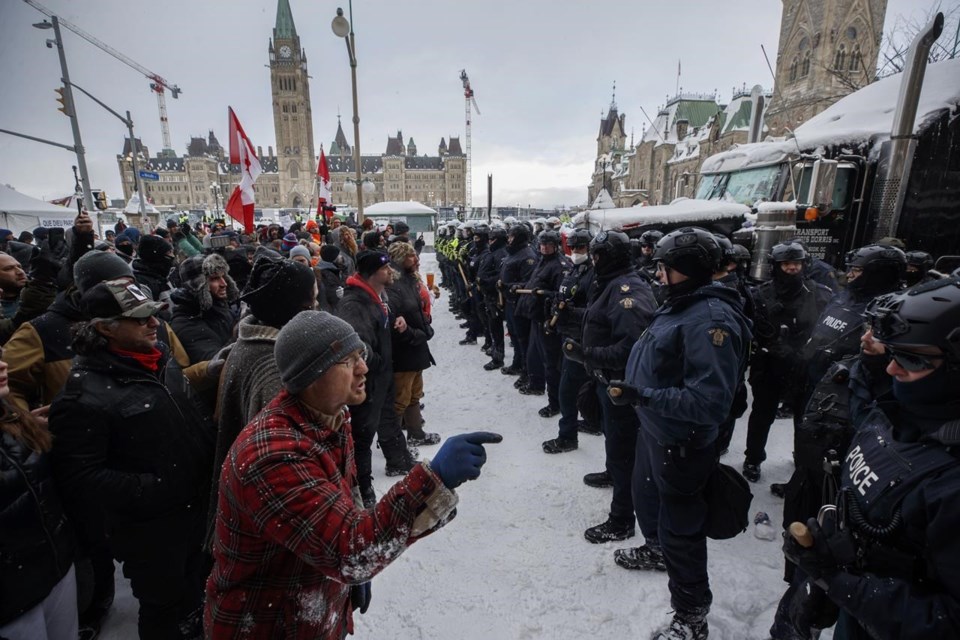OTTAWA — A national civil liberties group told a federal judge Monday the federal government has not clearly spelled out proper legal justification for its use of the Emergencies Act early last year in response to protests in the national capital and at key border points.
The Canadian Civil Liberties Association was among the groups and individuals in Federal Court to argue Ottawa lacked sound statutory grounds to invoke the emergency measures
The government contends the measures taken to deal with the pan-Canadian emergency situation were targeted, proportional, time-limited and compliant with the Canadian Charter of Rights and Freedoms.
The Public Order Emergency Commission, a mandatory review that takes place after invocation of the Emergencies Act, found the government met the very high threshold for using the law.
Now the legal arguments for and against the decision are being heard in a court of law.
The three-day hearing began Monday with the federal government's reasons why the matter should not be in court at all, given that the emergency measures have been revoked.
Justice Richard Mosley intends to rule at a later date on that point and proceed with hearing the arguments of the various parties on the merits of the overall case.
In early February 2022, downtown Ottawa was filled with protesters, many in large trucks that rolled into town beginning in late January.
Ostensibly a demonstration against COVID-19 health restrictions, the gathering attracted people with a variety of grievances against Prime Minister Justin Trudeau and the Liberal government.
The usually tranquil streets around Parliament were transformed by blaring rig horns, diesel fumes, makeshift encampments, and even a hot tub and bouncy castle as people settled in.
The influx, including some participants with roots in the far-right movement, prompted many businesses to shut their doors and aggravated residents with noise, pollution and harassing behaviour.
Public frustration simmered over a lack of enforcement action by Ottawa police.
Meanwhile, trucks clogged key border crossings, including key routes to the United States at Windsor, Ont., and Coutts, Alta.
On Feb. 14, the government invoked the Emergencies Act, which allowed for temporary measures including regulation and prohibition of public assemblies, the designation of secure places, direction to banks to freeze assets and a ban on support for participants.
It was the first time the law had been used since it replaced the War Measures Act in 1988.
In a letter to premiers the next day, Trudeau said the federal government believed it had reached a point "where there is a national emergency arising from threats to Canada's security.''
The civil liberties association maintains that legal threshold was not met.
The protests did not, as the Emergencies Act requires, create a "threat to the security of Canada" within the meaning of the Canadian Security Intelligence Service Act, nor was there a "national emergency" within the meaning of the emergencies law, the association argues in a written submission to the court.
"The Act does not permit the government to proclaim an emergency based on nebulous or strained claims about economic instability and international trade, a general sense of unrest, or foreign donations to a cause," the submission says.
"Even the presence of a small number of dangerous individuals in specific locations, while a proper priority for law enforcement, could not justify a nationwide emergency."
The federal government argues that the Emergencies Act's requirement of a "threat to the security of Canada" cannot be interpreted exclusively by reference to this phrase's meaning in the context of the CSIS Act.
Ewa Krajewska, a lawyer for the civil liberties association, told the court Monday that a public order emergency is a threat to the security of Canada that cannot be addressed using the usual laws, requiring invocation of the Emergencies Act.
"That's what it's supposed to be. It's not supposed to be something different. And the problem is, I still don't have, really, a fixed understanding of what that something else is," she said.
"And that is what is worrisome about this. Because if, for whatever horrible reason it needs to be invoked again, I think we need to know what that something else is."
In addition, the federal cabinet "needs to know what that is so that they can properly assess the information that they are receiving, in order to determine whether they are acting in accordance with the legislation," she said.
Further, the Emergency Measures Regulations and the Emergency Economic Measures Order ushered in by the proclamation fail scrutiny under various provisions of the Charter, the association says.
The Federal Court hearing includes others who filed actions contesting use of the emergency measures: the Canadian Constitution Foundation, Canadian Frontline Nurses and Kristen Nagle, and individuals Jeremiah Jost, Edward Cornell, Vincent Gircys and Harold Ristau.
The government argues federal officials believed, on reasonable grounds, that a public order emergency existed and necessitated the taking of temporary special measures.
The applicants are now asking the court "to use hindsight" to determine that use of the Emergencies Act was unnecessary, the attorney general's submission says.
"However, that is not what is required in these judicial reviews."
The government says the court's role is not to "step into the shoes" of the decision-makers, but rather to determine if the decision was reasonable in the context in which it was made.
This report by The Canadian Press was first published April 3, 2023.
Jim Bronskill, The Canadian Press



